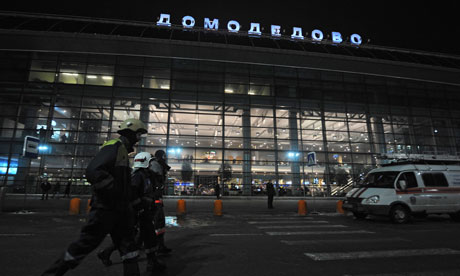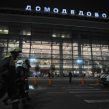
Airport Attack Shows Russian Government’s Failure to Provide a Clear Road Map to a Safer Future
Publication: Eurasia Daily Monitor Volume: 8 Issue: 21
By:

On January 29, Vladimir Markin, the spokesman for the Russian Investigative Committee, announced that investigators had determined the identity of the perpetrator of the bombing of Domodedovo airport in Moscow, which took place on January 24. According to official information, a suicide bomber detonated explosives in the international arrivals section of the airport, Russia’s busiest, killing 35 people and injuring over 120, including foreign nationals. Markin said investigators had established the identity of the 20-year-old male bomber, who originated from one of the republics of the North Caucasus. But the spokesman declined to name him or the republic he was from, citing the ongoing investigation. Markin said the terrorist attack specifically targeted foreigners (RIA Novosti, January 29).
While the Investigative Committee refused to disclose the name and the exact origins of the Domodedovo airport suicide bomber, it effectively ruled out a Dagestani link. In the same statement, the committee said that another terrorism-related crime which took place in Moscow had been solved. On December 31, 2010, an explosion took place at a Moscow hotel, killing only a suspected female suicide bomber. The blast reportedly took place when her suicide belt loaded with explosives accidently detonated. According to the Investigative Committee, a group had been preparing an attack in Moscow and several of its members were arrested in Dagestan. The committee emphasized that this group had no connection to the Domodedovo bombing and came from a different republic of the North Caucasus (www.sledcom.ru, January 29). On the same day, the Russian Antiterrorist Committee announced that the members of the terrorist group behind the failed December 31, 2010 attack originated from Dagestan (www.kavkaz-uzel.ru, January 29).
The latest terrorist attack in Moscow proved to be one of the most enigmatic, as both the authorities and observers grappled for some time with its possible origins. Even now, after Russian officials have announced they have solved the attack, many questions remain unanswered. In particular, the North Caucasus insurgents have been remarkably quiet about the Domodedovo attack, not having taken responsibility for it as of January 30. The government has put forward an unusual multitude of versions about who might be behind the attack.
The possible Middle Eastern origins of the Domodedovo suicide bomber were explored. Then the Russian government asked Pakistan to cooperate in identifying a male and a female suspect who had allegedly been trained as suicide bombers in the restive border area between Pakistan and Afghanistan. An ethnic Russian convert to Islam from the Stavropol region, Vitaly Razdobudko, was named as a suspect in the attack. Razdobudko was said to be a member of the so-called Nogai Jamaat (RIA Novosti, January 29). The name was most likely concocted by the security services, as the Muslim jamaats of the North Caucasus are formed according to a territorial rather than ethnic principle. Also ethnic Nogais (aka western Kazakhs) are dispersed across the North Caucasus, comprising no majority in any administrative unit. Subsequently, Razdobudko and his ethnic Russian girlfriend were said to have been responsible for the failed attack on December 31, 2010 at the Moscow hotel. It is a very strange coincidence that the hotel itself belongs to an enterprise called the Sporting Rifle Club of the Military-Hunting Society, which points to a possible link to the security services.
Anatoly Baranov, the editor-in-chief of the popular Russian website Forum-msk.org, pointed out that no 20-year-old person was on the official list of the 35 people killed in the Domodedovo airport attack. Baranov also dismissed the official version about the attack specifically targeting foreigners, noting that 27 of the 35 people killed were Russian citizens (www.forum-msk.org, January 30). On January 26, when the official version of the airport attack was still in flux, Prime Minister Vladimir Putin surprised observers by ruling out a Chechen link to the attack (ITAR-TASS, January 26). On January 27, the head of Ingushetia, Yunus-Bek Yevkurov, stated that, judging by the style of that attack, the North Caucasus insurgency was behind it (www.gazeta.ru, January 27).
The Russian government has an astonishingly poor record of investigating terrorist attacks, despite the proliferation of such attacks in the country in recent years. The perpetrators of the March 29, 2010 twin attack on the Moscow metro, which claimed 40 lives, were reportedly killed in Dagestan, including the head of the Islamic insurgency in the republic, Magomedali Vagabov. The investigation of the Beslan school hostage seizure in North Ossetia, which took place in 2004, has not been concluded as of yet. All of the perpetrators of the hostage-taking at Moscow’s Dubrovka Theater in 2002 were killed. The bombings of the Moscow-St. Petersburg Nevsky Express train in 2007 and 2009 have been investigated with unclear results. Terrorist suspects habitually are either all killed or never found, and there are practically no verifiable high-profile cases in which the perpetrators of terrorist are tried and sentenced.
President Dmitry Medvedev’s reaction to the latest terrorist attack at Domodedovo airport was less than reassuring, as he dismissed several low ranking officials, including the airport security chief. Following the March 2010 attack on the Moscow metro, Medvedev signed a special decree that should enhance security at especially vulnerable areas of Russia and protect them against possible terrorist attacks by 2014 (RIA Novosti, January 29). However, some Russian statesmen doubt that the terrorism threat can be alleviated through additional legislative actions or the allocation of more resources.
Gennady Gudkov, the deputy chairman of the Russian State Duma’s security committee, himself a former KGB operative, stated that the law enforcement agencies’ capabilities to fight terrorism, as well as legislative actions against terrorism, have been practically exhausted. According to Gudkov, the question has become a political one and needs to be addressed in a corresponding fashion. The Russian parliamentarian drew attention to the fact that the government’s expenditure on security equals or exceeds that on defense. Gudkov pointed out that while the security services were very successful in killing insurgent leaders, the law enforcement agencies were unable to eliminate the breeding ground for the insurgent networks – a sign that shows, in Gudkov’s opinion, the need for substantial political reform, like the establishment of civilian control over the security services and work with Islamic educators. Gudkov alleged that there were signals of the Islamist ideas spreading to the Russia’s Volga region, predominantly Muslim populated Tatarstan and Bashkortostan, the two largest republics in Russia (www.echo.msk.ru, January 29).
As the Russian government’s promises to end terrorism “once and for all” have seemingly failed to materialize, the Russian authorities are challenged with the issue of growing insecurity. In the sensitive electoral period of 2011-2012 in Russia, the terrorism issue may once again be perceived by some political players as their trump card.




